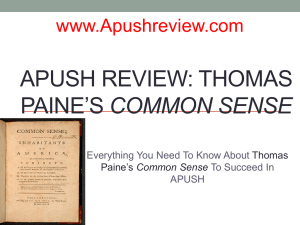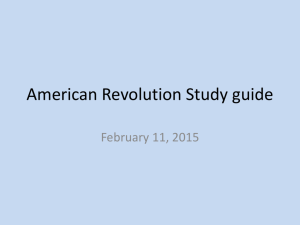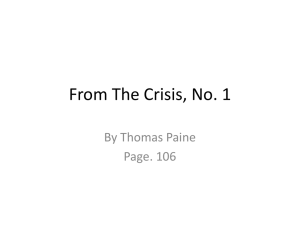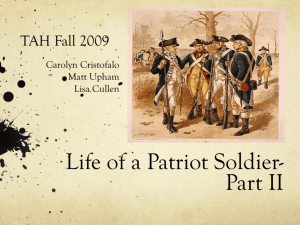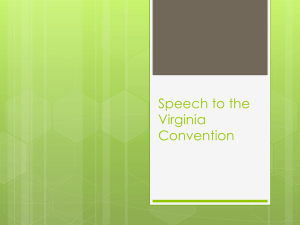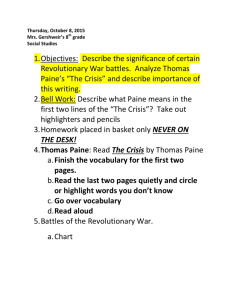The Crisis, No. 1
advertisement
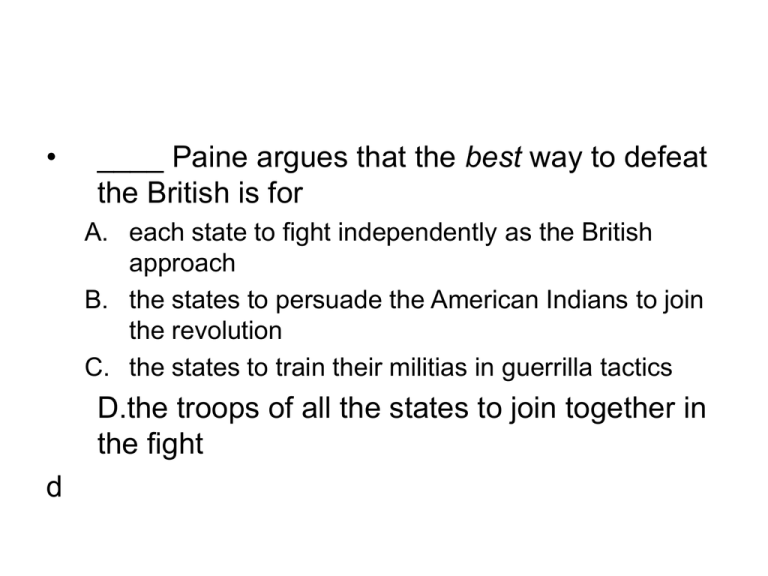
• ____ Paine argues that the best way to defeat the British is for A. each state to fight independently as the British approach B. the states to persuade the American Indians to join the revolution C. the states to train their militias in guerrilla tactics D.the troops of all the states to join together in the fight d • ____ Paine suggests that a state that surrenders its arms to the British would have to A. B. C. D. D create its own government face destruction by the British troops send its own ambassadors to Britain suffer the hostility of the other states • ____ Paine contends that the Tories are A. committing treason by spying on their neighbors B. enjoying greater wealth than the average American C. possibly aiding and encouraging the British army D. preparing to leave America to return to Britain A • ____ By comparing the British king to a thief and a housebreaker, Paine suggests that A. Britain has robbed America of its natural resources B. British soldiers are launching sneak attacks against the colonists C. The British are trying to take what is not theirs D. The king is in dire need of money for his treasury C • ____ In his conclusion, Paine intends to inspire readers by A. B. C. D. d describing in detail the battle of Princeton explaining why General Howe will succeed pointing out the strengths of the colonial army recounting all of the wrongs the colonists have suffered • ____ Which mode of persuasion is used in Paine’s line, “Tyranny, like hell, is not easily conquered”? A. B. C. D. A simile anecdote logic Personification • ____ When Paine writes, “The heart that feels not now, is dead: The blood of his children will curse his cowardice, who shrinks back in time when a little might have saved the whole,” he is using A. B. C. D. C a family-based theme allusions to emphasize his points dramatic imagery plain, ordinary language to present his thoughts • ____ Which of the following is not an example of Paine’s use of plain language? A. “…I turn with the warm ardor of a friend to those who have nobly stod, and are yet determined to stand the matter out…” B. “A single successful battle next year will settle the whole.” C. “I thank God that I fear not, I see no real cause for fear.” D. “My own line of reasoning is to myself as straight and clear as a ray of light.” D • ____ In the first Crisis paper, Paine compares the British to A. B. C. D. B atheists devils murdering thieves pompous fools • ____ Paine wrote The Crisis, No. 1 for A. B. C. D. D General Washington’s staff leaders of the thirteen colonies members of the British Parliament soldiers in the American army • ____ Both Paine and Henry felt that the British were treating the colonists as A. B. C. D. C cowards criminals slaves Villains • ____ Paine, like Henry, believed that revolution was A. B. C. D. A inevitable tragic unlikely Unnecessary • ____ The first two sentences of the passage are an appeal to A. B. C. D. A courage and patriotism honor and dignity religious piety sentimental emotions • Paine’s main purpose in The Crises, No. 1 is to A. B. C. D. D describe the current status of the war list the misdeeds of King George plead for lower taxes urge Americans to greater action • ____ Who does Paine believe is responsible for the British attacks on New Jersey and other middle states? A. B. C. D. A cowardly colonists Hessian soldiers the militia the new colonial army • ____ When Paine speaks of the “summer soldier and the sunshine patriot,” to whom is referring? A. B. C. D. B confident and optimistic Tories people who are unwilling to make sacrifices soldiers who will fight only in good weather volunteers fighting in the summer campaign • ____ Why does Paine believe that God will support the colonists in a war against the British? A. More religious people live in the colonies than in England. B. The British king is a murderer C. The colonists tried repeatedly to avoid a war. D. The English butchered the French in an earlier war. C • ____ Henry points out a contradiction between British A. claims of peaceful intent and their growing military presence in America B. democratic tradition and the institution of royalty C. interest in the Colonies and neglect of the colonists’ needs d. settlement of America and maintenance of their government in Britain A • A. B. C. D. A 19._____Henry recounts several instances in which the colonists sought agreement and acceptable terms with the British. He does this to persuade the delegates that all peaceful options have been tried and have failed it is treason to seek peace with the British the British army is weak and can be easily defeated the colonists have behaved in cowardly way • A. B. C. D. D ._____Henry states that the colonists have the advantage over the British of a greater number of people a more rigorously trained army knowledge of the terrain moral correctness and conviction • A. B. C. D. C ___Henry advocates immediate action by the colonists because the British army is preparing to march into Virginia the colonists will become apathetic with time the conflict has already begun and the colonists have no other choice but to fight the king is too far away to order a quick response • A. B. C. D. C 22._____When Henry declares, “I know of no way of judging of the future but by the past. And judging by the past, I wish to know what there has been in the conduct of the British ministry…to justify those hopes with which gentlemen have been pleased to solace themselves…” he is using: deceptive language to confuse his listeners images that his listeners may not understand logic to engage his listeners’ attention parallel structures to clarify his intentions • .____The main purpose of Patrick Henry’s speech is to A. convince the delegates that he should be chosen to lead the revolution B. describe the history of British colonization in America C. persuade his fellow delegates to fight against the British rule D. seek revenge for personal injuries committed by the British king C • A. B. C. D. D 24.____Which of the following is BEST example of persuasion through an emotional appeal? “I know of no way of judging of the future but by the past.” “Mr. President, it is natural to man to indulge in the illusions of hope.” “Sir, we have done everything that could be done.” “There is no retreat, but in submission and slavery! Our chains are forged!” • A. B. C. D. B 25.____Which of the following of the BEST example of persuasion through an appeal to reason? “An appeal to arms and the God of Hosts is all that is left us!” “Let us not deceive ourselves, sir. These are the implements of war and subjugation; the last arguments to which kings resort.” “The war is actually begun! The next gale that sweeps from the north will bring to our ears the clash of resounding arms!” “They are sent over to bind and rivet upon us those chains which the British ministry have been so long forgiving.” • A. B. C. D. D 26.____Henry’s speech to the Virginia Convention helped inspire people to attend church services explore the new continent obey the Stamp Act rebel against England • A. B. C. D. C 27.____What does Henry believe will happen in a war between England and the colonies? European nations will step in to settle differences. The colonists cannot win but must not die in slavery. The colonists will triumph in spite of England’s might. The fighting will continue for decades. • A. B. C. D. C 28.____In previous attempts to assert their rights, the colonists were half-hearted ill-prepared rejected Successful 29.____Which method of writing does Henry’s speech represent? • description • exposition • narration • Persuasion D • A. B. C. D. A 30.____The reference to the song of the siren in the second paragraph is used as a metaphor for falsehood honesty vanity Violence • 51. Shall we gather strength by irresolution and inaction? Shall hope, until our enemies shall have us bound hand and foot?” we acquire the means of effectual resistance, by lying supinely on our backs, and hugging the delusive phantom of hope • LOGICAL • 52. For my own part, I consider it as nothing less than a question of freedom or slavery; and in proportion to the magnitude of the subject ought to be the freedom of the debate • EMOTIONAL • 53. Are we disposed to be of the number of those who, having eyes, see not, and, having ears, hear not, the things which so nearly concern their temporal salvation? For my part, whatever anguish of spirit it may cost, …” • LOGICAL • 54. I know of no way of judging of the future but by the past. And judging by the past, I wish to know what there has been in the conduct of the British ministry for the last ten years to justify those hopes with which gentlemen have been pleased to solace themselves and the House. • LOGICAL • 55. Ask yourselves how this gracious reception of our petition comports with those warlike preparations which cover our waters and darken our land. Are fleets and armies necessary to a work of love and reconciliation? • LOGICAL • 56. Has Great Britain any enemy, in this quarter of the world, to call for all this accumulation of navies and armies? No, sir, she has none. They are meant for us: they can be meant for no other. • LOGICAL • 57. They are sent over to bind and rivet upon us those chains which the British ministry have been so long forging. • EMOTIONAL • 58. Sir, we have done everything that could be done to avert the storm which is now coming on. We have petitioned; we have remonstrated; we have supplicated; we have prostrated ourselves before the throne, … • LOGICAL • 59. An appeal to arms and to the God of hosts is all that is left us! • EMOTIONAL • 60. There is no retreat but in submission and slavery! Our chains are forged! Their clanking may be heard on the plains of Boston! The war is inevitable--and let it come! I repeat it, sir, let it come. • EMOTIONAL • 61. Is life so dear, or peace so sweet, as to be purchased at the price of chains and slavery? Forbid it, Almighty God! I know not what course others may take; but as for me, give me liberty or give me death! • EMOTIONAL • 62. But when shall we be stronger? Will it be the next week, or the next year? Will it be when we are totally disarmed, and when a British guard shall be stationed in every house? Shall we gather strength by irresolution and inaction? • LOGICAL • 63. Besides, sir, we shall not fight our battles alone. There is a just God who presides over the destinies of nations, and who will raise up friends to fight our battles for us. The battle, sir, is not to the strong alone; it is to the vigilant, the active, the brave. • EMOTIONAL • • Britain, with an army to enforce her tyranny, has declared that she has a right (not only to TAX) but "to BIND us in ALL CASES WHATSOEVER EMOTIONAL • and if being bound in that manner, is not slavery, then is there not such a thing as slavery upon earth. Even the expression is impious; for so unlimited a power can belong only to God. • EMOTIONAL • However, the fault, if it were one, was all our own*; we have none to blame but ourselves. • LOGICAL • I have as little superstition in me as any man living, but my secret opinion has ever been, and still is, that God Almighty will not give up a people to military destruction, or leave them unsupportedly to perish, who have so earnestly and so repeatedly sought to avoid the calamities of war, by every decent method which wisdom could invent • EMOTIONAL • …and I am as confident, as I am that God governs the world, that America will never be happy till she gets clear of foreign dominion • EMOTIONAL • Wars, without ceasing, will break out till that period arrives, and the continent must in the end be conqueror; for though the flame of liberty may sometimes cease to shine, the coal can never expire. • EMOTIONAL • America did not, nor does not want force; but she wanted a proper application of that force. • LOGICAL • A summer's experience has now taught us better; yet with those troops, while they were collected, we were able to set bounds to the progress of the enemy, and, thank God! they are again assembling. • logical • Howe is mercifully inviting you to barbarous destruction, and men must be either rogues or fools that will not see it. I dwell not upon the vapors of imagination; I bring reason to your ears, and, in language as plain as A, B, C, hold up truth to your eyes. • LOGICAL • My own line of reasoning is to myself as straight and clear as a ray of light. Not all the treasures of the world, so far as I believe, could have induced me to support an offensive war, for I think it murder; but if a thief breaks into my house, burns and destroys my property, and kills or threatens to kill me, or those that are in it, and to "bind me in all cases whatsoever" to his absolute will, am I to suffer it? • EMOTIONAL • Howe, it is probable, will make an attempt on this city [Philadelphia]; should he fail on this side the Delaware, he is ruined. If he succeeds, our cause is not ruined. He stakes all on his side against a part on ours; admitting he succeeds, the consequence will be, that armies from both ends of the continent will march to assist their suffering friends in the middle states; for he cannot go everywhere, it is impossible. I consider Howe as the greatest enemy the Tories have; he is bringing a war into their country, … • LOGICAL • Yet it is folly to argue against determined hardness; eloquence may strike the ear, and the language of sorrow draw forth the tear of compassion, but nothing can reach the heart that is steeled with prejudice. • EMOTIONAL • The heart that feels not now is dead; the blood of his children will curse his cowardice, who shrinks back at a time when a little might have saved the whole, and made them happy. • EMOTIONAL • I feel no concern from it; but I should suffer the misery of devils, were I to make a whore of my soul by swearing allegiance to one whose character is that of a sottish, stupid, stubborn, worthless, brutish man. I conceive likewise a horrid idea in receiving mercy from a being, who at the last day shall be shrieking to the rocks and mountains to cover him, and fleeing with terror from the orphan, the widow, and the slain of America. • EMOTIONAL • Were the back counties to give up their arms, they would fall an easy prey to the Indians, who are all armed: this perhaps is what some Tories would not be sorry for. Were the home counties to deliver up their arms, they would be exposed to the resentment of the back counties who would then have it in their power to chastise their defection at pleasure. • LOGICAL • Twice we marched back to meet the enemy, and remained out till dark. The sign of fear was not seen in our camp, and had not some of the cowardly and disaffected inhabitants spread false alarms through the country, the Jerseys had never been ravaged. Once more we are again collected and collecting; our new army at both ends of the continent is recruiting fast, and we shall be able to open the next campaign with sixty thousand men, well armed and clothed. • LOGICAL • By perseverance and fortitude we have the prospect of a glorious issue; by cowardice and submission, the sad choice of a variety of evilsa ravaged country- a depopulated cityhabitations without safety, and slavery without hope- our homes turned into barracks and bawdy-houses for Hessians, and a future race to provide for, whose fathers we shall doubt of. Look on this picture and weep over it! and if there yet remains one thoughtless wretch who believes it not, let him suffer it unlamented. • EMOTIONAL RHETORIC • 31.…and truth to the song of siren till she transforms us into beasts. (2) • ALLUSION • “Suffer not yourselves to be betrayed with a kiss”(3). • ALLUSION • “Sir, we have done everything that could be done to avert the storm which is now coming on”(3). • METAPHOR • We have petitioned; we have remonstrated; we have supplicated; we have prostrated ourselves to the throne, … • PARALLELISM • .“Our petitions have been slighted, our remonstrations have produced…, our supplications have been disregarded;”(3) • PARALLELISM • .“We must fight! I repeat it, sir, we must fight”(3) • REPETITION • and let it come! I repeat it sir, let it come”(4) • REPETITION • Tyranny, like hell, is not easily conquered; • SIMILE • I cannot see on what grounds the king of Britain can look up to heaven for help against us: a common murderer, a highwayman, or a house-breaker, has as good a pretence as he. • METAPHOR • My own line of reasoning is to myself as straight and clear as a ray of light. • SIMILE • but I should suffer the misery of devils, were I to make a whore of my soul by swearing allegiance • METAPHOR • The ministry recommended the same plan to Gage, and this is what the tories call making their peace, "a peace which passeth all understanding" indeed! • ALLUSION • Mutual fear is the principal link in the chain of mutual love, and woe be to that state that breaks the compact • METAPHOR • Forbid it, Almighty God! I know not what course others may take; but as for me, give me liberty or give me death! • ANTHITHESIS • But when shall we be stronger? Will it be the next week, or the next year? • RHETORICAL QUESTION
